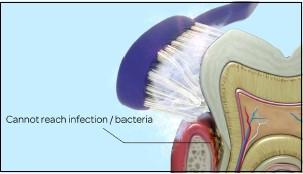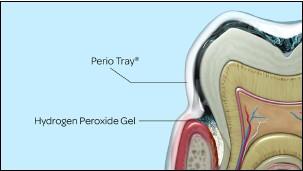Gum Disease Treatment/Perio Protect
Periodontal (gum) disease is a growing oral health problem and one of the most common conditions we treat.
While periodontal disease is preventable with good oral hygiene habits, it can still develop. And the earlier we catch it, the easier it will be to treat.
What Is Periodontal Disease?
Periodontal disease, or gum disease, is caused by plaque that builds up on the teeth, especially under the gumline. The sticky plaque attracts bacteria and eventually turns into hard tartar. The tartar and bacteria irritate the gums and cause infection.
Preventing Periodontal Disease
 Brushing twice a day and flossing once using proper techniques removes a lot of plaque. However, even the most diligent brusher and flosser may have difficulty removing all the plaque, especially under the gumline. You can improve your chances of preventing gum disease with twice-yearly professional dental cleanings from a skilled dental hygienist as recommended by the American Dental Association.
Brushing twice a day and flossing once using proper techniques removes a lot of plaque. However, even the most diligent brusher and flosser may have difficulty removing all the plaque, especially under the gumline. You can improve your chances of preventing gum disease with twice-yearly professional dental cleanings from a skilled dental hygienist as recommended by the American Dental Association.
But what if you brush and floss and get your regular cleanings like you are supposed to and still get periodontal disease? Other factors can contribute to and cause a predisposition to gum disease:
- Smoking increases your risk of developing gum disease. If you need help quitting, speak with your dentist.
- Diabetes and heart disease are both linked to periodontal disease.
- Numerous prescription medications cause dry mouth that contributes to gum disease.
- Illnesses like cancer inhibit your immune system and increase your risk of developing periodontal disease.
- Genetics also plays a role as gum disease tends to run in families.
Treating Periodontal Disease
How we address gum disease depends on how advanced it is and how much damage it has caused. Treating gum disease is important even in the early stage called gingivitis. As a progressive disease, delaying treatment will only allow further damage to your teeth and the bones and ligaments that support them.
Worse yet, untreated gum disease can also contribute to general health problems like heart and lung disease, stroke, dementia, and pregnancy complications.
Treating mild gum disease requires a renewed commitment to good oral hygiene habits and daily use of an antimicrobial mouthwash. Treatment for moderate-to-advanced gum disease may involve a deep cleaning known as scaling and root planing. Our hygienist removes tartar buildup from below the gumline during this treatment and smooths rough spots where bacteria gather.
If you are concerned that you might have periodontal disease, don’t hesitate to call us to schedule an appointment and provide treatment if needed.
Scaling and Root Planing
If your dentist recommends scaling and root planing (SRP), it means you have symptoms of gum disease or periodontal disease. Dental deep cleaning is necessary to stop the damaging effects of this disease.
We all have tiny, open spaces between our teeth and gums, which dentists call a sulcus. Bacteria, plaque, and calculus can build up in these areas over time and become problematic if not removed through brushing, flossing, and regular dental cleanings. When this happens, the gums become swollen, the spaces get deeper, and bacteria make their way further and further down into the gums. A healthy sulcus is less than 3 mm deep, while greater depth suggests a problem. Your dentist will check the depth of the area using a special probe.
When bacteria create an infection in the gums, it’s called gingivitis. If it isn’t severe, regular dental cleaning and more rigorous dental hygiene can correct it. If the bacteria reach deep into the gums, an infection can damage the underlying structures, like the tooth root, attached ligaments, and the bone. This is periodontal disease, and it can cause tooth loss and other health problems if it’s not addressed.


